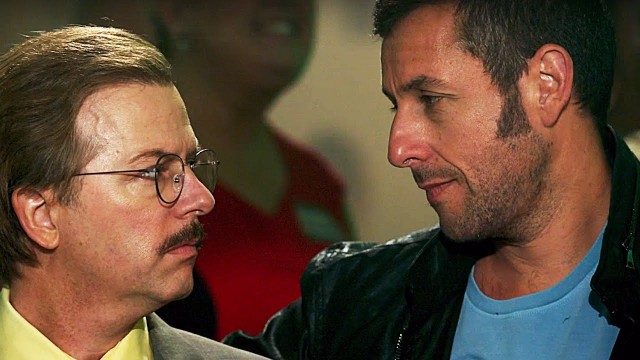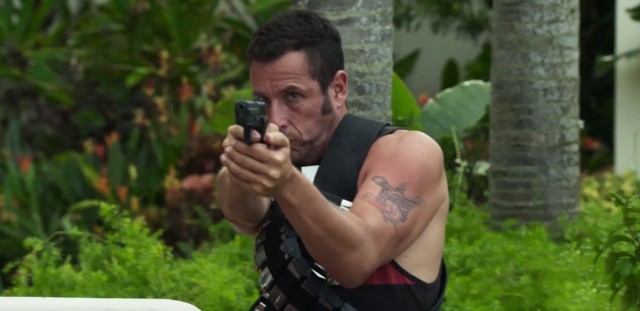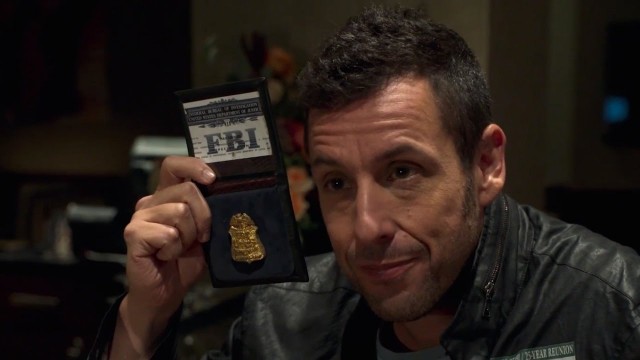With Happy Madison seemingly retreating from theatrical movies at this point (or possibly being banned from them, after studios finally got tired of the incessant negative reviews and dwindling box office returns), Adam Sandler’s outfit has settled into their four-movie deal with Netflix, which unfortunately begat last year’s horrendous The Ridiculous 6 to start. That definitely wasn’t a good way to kick things off, especially after the movie only spearheaded the Netflix deal because every studio that Sandler pitched it to quickly rejected it, and rightly so, because it’s terrible.
The second movie in the Netflix deal however, The Do-Over, pretty much represents exactly that for Happy Madison’s relationship with Netflix, as Sandler has made this second movie explicitly with Netflix in mind, without any intention of taking it to theatres like with The Ridiculous 6. That at least gives Sandler’s crew the opportunity to grow up a bit this time, and to be fair, The Do-Over is at least made with more maturity and tact than The Ridiculous 6 was. That’s the good news.
The bad news however is that, while The Do-Over is a better movie than The Ridiculous 6, it’s still not a good comedy for the most part. Happy Madison’s second Netflix Original Film is perfectly mediocre, which does represent progress, after The Ridiculous 6 was so aggressively abysmal, but that’s still not a winning endorsement. If you happen to be a fan of Happy Madison, you’ll have some fun with The Do-Over here and there, but it’s still too forgettable and phoned-in to be worth the viewing for most people.
Mercifully, The Do-Over is pretty focused, and leaves out most of Sandler’s usual running mates. Most of the movie revolves around two down-on-their-luck fortysomethings, with one being roped along after the other fakes their deaths, in an effort to start fresh. Adam Sandler portrays the instigator, Max Kessler, a cool high school friend of loser bank manager, Charlie McMillan, played by David Spade, with Charlie being roped into Max’s plan of a full life reboot against his will, despite having a nasty ex-wife, and having to deal with her former husband’s bratty children and unwelcome presence, and that’s before considering that Charlie’s bank branch is within a grocery store.
In all honesty, this isn’t a bad premise for a comedy, especially when things inevitably spiral out of control. Of course, that comedy would be a lot better in greater hands than Happy Madison’s, but points for trying. It would also help however if Sandler and Spade gave more than their usual listless performances, which are once again on display here. Every so often, one of them will emote a bit, but it still feels like Sandler and Spade aren’t trying as hard as they should be. Sandler especially too often sounds disconnected from the script, with his Max supposedly having dark, heartbreaking secrets as the movie goes on, but Sandler never really sells it, since he’s still just coasting on the bare minimum.
Even the movie’s supporting cast often feels like they’re sleepwalking through their performances. Paula Patton’s female lead, Heather, who doesn’t even show up until around the halfway mark, never speaks with a shred of credibility, and that makes it impossible to care about Charlie ultimately escaping his bitchy prom queen wife, who is barely worth mentioning past the opening minutes. Some of the other supporting actors like Matt Walsh and Kathryn Hahn are trying a bit harder, and Hahn especially really gives The Do-Over an appreciated shot-in-the-arm whenever she’s on screen, but nobody ever escapes the feeling of slumming it for an easy paycheque in this movie, least of all its leads, and its equally forgettable and forced villains.
Surprisingly, the initial setup and opening of The Do-Over is not too bad, and would have been great, had the jokes not come from the half-hearted likes of Happy Madison. The initial premise of the movie is just fine, and had the movie stuck with centering around its con and its extreme mid-life crisis theme, it might have at least entered the realm of true competence, especially when The Do-Over actually markets itself to proper adults this time, now that Happy Madison has explicitly put it together for Netflix.
For some strange reason though, the movie takes a hard left turn onto contrivance lane past the first act, and comes up with a very forced, unnecessary action-comedy bend that quickly has The Do-Over collapsing under its own meager weight. As with The Ridiculous 6, The Do-Over tries to frame Adam Sandler as a comedic action star here, and yet again, it rings laughably hollow. It feels like Sandler is only injecting this action element to prove that he’s still young and awesome, but it’s completely unnecessary, and works against the simple, effective idea of two idiots trying to escape their problems in a very ill-advised way, much like Netflix’s more entertaining previous Original Film, Special Correspondents.
It feels weird to accuse Happy Madison of over-ambition, given the studio’s frequent problem with half-assing their movies, but as the adage goes in this case, less is more. The Do-Over frequently starts hitting the wrong notes around the half-hour mark, simply because it starts trying to take itself far too seriously, when the performances and jokes still feel like they’re weirdly going at half-tilt. In the end, the story feels like two half-baked ideas that were sandwiched together in hopes of making a cohesive whole, but it’s really anything but cohesive, and just ends up making the movie feel messy and forgettable.
Steven Brill, one of several mercenary directors in Adam Sandler’s contact list, helms The Do-Over, though Brill’s direction feels barely present at the best of times. The movie’s very sloppy action choreography is consistently distracting, and further draws attention to the fact that The Do-Over really shouldn’t have tried to incorporate action stylings at all. Even beyond that though, Brill doesn’t seem to get anything out of Sandler, Spade or anyone else that really elevates the comedy, and just seems to resign himself to whatever Sandler wants to do in any given scene.
Fortunately, there seems to be just enough oversight to prevent Sandler from going off the ludicrous, racist and generally offensive bender that The Ridiculous 6 pancaked into, which, again, makes The Do-Over better than its insufferable Netflix predecessor, at least. This movie is still barely hovering off of the ground though, and too often fails to engage the audience, even when it wants to be cool and subversive. and Brill doesn’t seem like he cares enough to add any real energy to the comedy on display, or so it would appear.
There’s very little to say about The Do-Over, which presents a decent premise that is quickly mucked up by Happy Madison’s intervention. The fact that Sandler himself didn’t contribute to this script, unlike The Ridiculous 6, might have played a part in The Do-Over not feeling like it completely flies off the rails into an atrocious trainwreck, but it’s not enough to really make the movie stand out, on Netflix’s catalogue or otherwise. Even the somewhat average Special Correspondents managed more heart, charm and laughs than The Do-Over ever does.
Unlike The Ridiculous 6, The Do-Over is reasonably watchable for anyone that doesn’t have a deep-fried cerebral cortex, but that still doesn’t really make it worth your time in most cases. It’s progress for Happy Madison, and inoffensive if you really have nothing better to do with your Netflix time, but if you were expecting this movie to elevate the Sandler outfit’s standard in any way, you’ll be disappointed. There’s two movies left in the Netflix deal though. Maybe the next one will edge Sandler and his buddies ever closer to being truly decent again.






